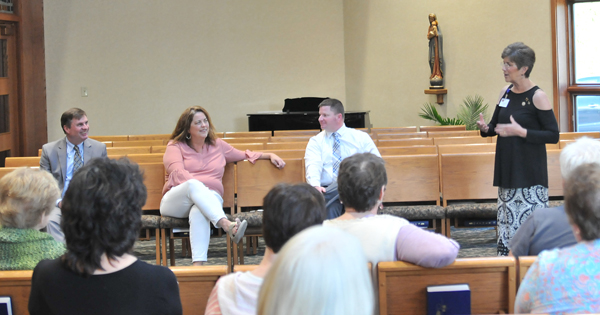By Lindsay Steele
The Catholic Messenger
BETTENDORF — Traumatic events, such as the recent school shooting in Florida, can rattle someone’s sense of security. Children, especially, may not know how to express or process what they are feeling.
To help adults better understand how they can accompany children through traumatic events, St. John Vianney Parish’s health ministry team hosted a presentation May 7 in Bettendorf. Chris McCormick Pries, clinical director at Vera French Community Mental Health Center in Davenport and a member of the parish’s health ministry team, facilitated the presentation. A local police chief and two high school administrators offered their insights throughout the presentation.

Phil Redington, Bettendorf’s chief of police, left; Joy Kelly, principal of Bettendorf High School, and Mike Peakin, assistant principal of Pleasant Valley High School, address a crowd at St. John Vianney Parish in Bettendorf during a May 7 presentation by mental health expert Chris McCormick Pries on helping children through traumatic events.
The parish’s health ministry team planned the event in response to families who had expressed an interest in learning how to communicate with kids about “things that are really hard to talk about,” McCormick Pries said. She said children may face lifelong health and mental health difficulties if they are unable to cope in a healthy way. It’s important for parents and other adults to try to intervene early on.
Different events affect children differently, she explained. Children may be reacting to a traumatic event in their own life, trauma that has happened to someone they know or traumatic events they’ve seen on television. McCormick Pries recalled the shock she felt as a child seeing footage of the Vietnam War on television. “It was my first time seeing conflict, blood, hard stuff.”
Adults should be aware that age is a huge factor in how children process trauma. Children ages 5 and younger have two primary concerns, McCormick Pries said. “They basically want to know … am I safe and who is going to take care of me?” Children ages 6 through 11 have difficulty separating fantasy and reality and are more sensitive to seeing violence and trauma on television. Children should avoid watching such coverage at home and with friends. Teenagers are more of a mixed bag, as previous experiences generally dictate their responses to current events. But, generally, they want adults to be direct and honest.
It’s important for parents and adults to address issues which may be causing stress for a child. Children may not spontaneously bring up a troublesome topic, but that doesn’t mean they aren’t thinking about it, McCormick Pries said. Without facts, children will likely fill in the blanks and draw their own conclusions. Good conversation starters include: “What do you think about what’s happening in the world?”
“What have you heard about (this event)? What are your friends talking about?” Listen and be patient. Children who are too young to identify their feelings may project their fears into the stories they make up or in artwork, so McCormick-Pries encourages adults to be patient and look for clues.
In these conversations, children of all ages need to hear that their feelings are valid. Young people need to know they are safe and be reassured that their parents and other adults (such as priests, teachers and local police) are working to ensure that safety, McCormick Pries said.
It can be helpful for a child to hear adults communicate their fears and how they deal with those fears in a healthy way. Children’s reactions to trauma are strongly influenced by adults’ response to trauma. “Kids take their cues from us,” McCormick Pries said. However, adults must be careful not to burden children and make them feel as if they need to care for the adult.
Adults can encourage children to “find the helpers,” as Fred Rodgers of Mr. Rodger’s Neighborhood used to say. Paying attention to the “heroic” people that aid individuals in tragedy can help a child understand that for every bad person in the world, there are many more good ones.
McCormick Pries and the panelists said that teens can find healing through focusing on the things they can control. This can include taking on advocacy roles or showing compassion to people who may be hurting. “Doing something helps master that feeling of helplessness,” McCormick Pries said.
Panelist Joy Kelly, principal of Bettendorf High School, said she tries to be direct and honest with teens. In the wake of events such as the recent school shooting, she tells students, “It’s possible, but not probable” that something like that might happen locally. “So go and live your life, because some of those pieces you aren’t going to be able to control.”
Sometimes, adults in a child’s life will not be able to offer the assistance he or she needs. “Know when to seek outside help,” McCormick Pries said. If a child is stuck in a rut for a few months, parents or guardians should try sharing their concerns with a school counselor or family doctor.
During the Q&A session, one audience member asked about the shortage of mental health professionals in the area. McCormick Pries said it’s important to talk to state legislators about the importance of supporting state mental health funding and programs. Additionally, it’s important for adults to encourage young people to consider pursuing mental health careers.
For more information on the presentation, call St. John Vianney Parish at (563) 332-7910 and leave a message for the Health Ministry team.











